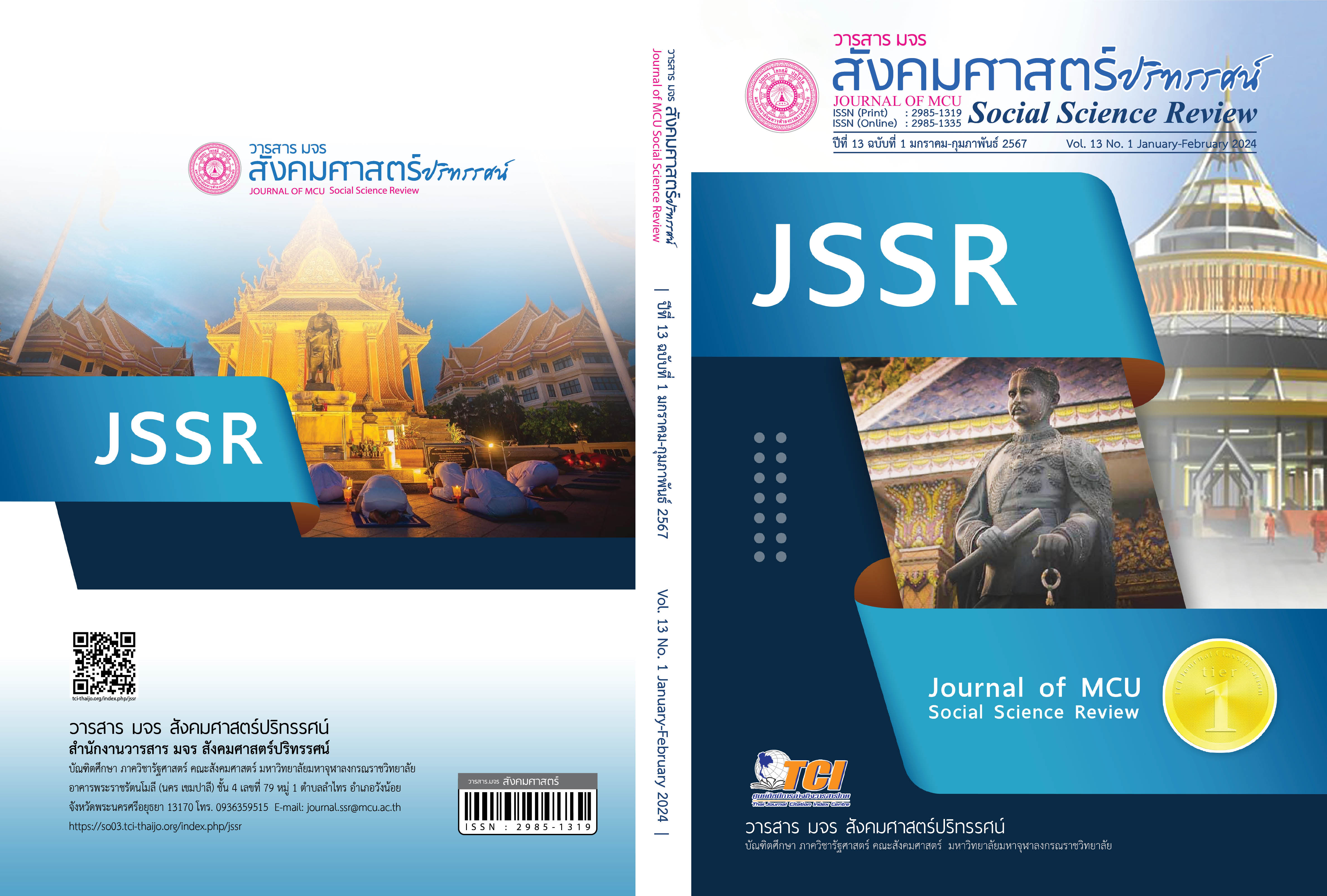ทัศนะภัยคุกคามไทยต่อสหรัฐอเมริกาและจีน หลังการรัฐประหาร 2006 และ 2014
คำสำคัญ:
ภัยคุกคาม, สหรัฐอเมริกาและจีน, การรัฐประหารบทคัดย่อ
บทความวิชาการนี้มีวัตถุประสงค์เพื่อศึกษาทัศนะภัยคุกคามของไทยที่มีต่อสหรัฐอเมริกาและจีนหลังเกิดการรัฐประหาร 2006 และ 2014 โดยศึกษาทัศนะภัยคุกคามจากรายงานส่วนบุคคลของนักศึกษาวิทยาลัยป้องกันราชอาณาจักร (วปอ.) ผู้เป็นบุคคลสำคัญและมาจากการแต่งตั้งของรัฐบาลรัฐประหารผ่านแนวคิดทัศนะภัยคุกคามของ David Singer ซึ่งพบว่าทัศนะของไทยที่มีต่อสหรัฐอเมริกาและจีนนั้นเป็นการไม่ไว้วางใจทั้ง 2 ประเทศ เพราะสหรัฐอเมริกาอาจถอนตัวออกจากภูมิภาคอาเซียนได้ และจีนอาจเป็นประเทศมหาอำนาจที่ก้าวร้าวได้เช่นกัน จากทัศนะภัยคุกคามเช่นนี้ หลังการรัฐประหาร ไทยจึงพยายามป้องกันความเสี่ยงจากเหตุการณ์ที่ไม่พึงประสงค์ข้างต้นด้วยการสร้างความร่วมมือทางความมั่นคงกับทั้งสหรัฐอเมริกาและจีน คือ การฝึกซ้อมร่วมทางทหารกับมหาอำนาจ โดยบทความนี้นำเสนอการฝึกซ้อมร่วมทางทหารตั้งแต่ปีค.ศ. 2007 – 2017 ซึ่งมีความเปลี่ยนแปลงและพัฒนาการด้านความมั่นคงของไทยต่อสหรัฐอเมริกาและจีนอย่างเห็นได้ชัดคือ การฝึกซ้อมร่วมระหว่างไทย-สหรัฐอเมริกามีการลดความช่วยเหลือทางทหารและความเข้มข้นของการฝึกลง ในขณะที่การฝึกซ้อมระหว่างไทย-จีนมีความเข้มข้นของการฝึกซ้อมมากขึ้นในแต่ละปี ดังนั้น ความร่วมมือทางทหารระหว่างไทยกับสหรัฐอเมริกาและจีนในช่วงหลังการรัฐประหาร 2006 และ 2014 จึงสอดคล้องกับทัศนะของไทยที่ยังไม่ไว้วางใจต่อประเทศมหาอำนาจทั้งสอง
เอกสารอ้างอิง
กรมกิจการพลเรือนทหารเรือ. (2559). พิธีเปิดการฝึกผสม กองทัพเรือไทย-กองทัพเรือสาธารณรัฐประชาชนจีน BLUE STRIKE 2016. สืบค้น 11 พฤศจิกายน 2565, จาก https://bit.ly/3lqASG6
เขียน ธีระวิทย์. (2539). การกำหนดนโยบายต่างประเทศเปรียบเทียบ. กรุงเทพฯ: จุฬาลงกรณ์มหาวิทยาลัย.
คมชัดลึก ออนไลน์. (2555). โหมโรง'คอบร้าโกลด์ 2012 รหัส HEAVY YEAR. สืบค้น 11 พฤศจิกายน 2565, จาก https://www.komchadluek.net/scoop/122216
_____. (2559). Blue Strike 2016 จีนหวังโชว์เขี้ยวเล็บกำลังรบ. สืบค้น 11 พฤศจิกายน 2565, จาก https://www.komchadluek.net/scoop/225880
ชัชชัย ภัทรนาวิก. (2559). ยุทธศาสตร์ของไทยที่เป็นผลกระทบจากยุทธศาสตร์ของจีนในทะเลจีนใต้ต่ออาเซียน. กรุงเทพฯ: สถาบันวิชาการป้องกันประเทศ.
ไทยรัฐ ออนไลน์. (2556). เกาะติดฝึกผสม ภายใต้รหัส Strike 2013. สืบค้น 11 พฤศจิกายน 2565, จาก https://www.thairath.co.th/news/politic/390551
วรพงษ์ สง่าเนตร. (2559). บทบาทของกองทัพไทยในการดำเนินการความสัมพันธ์ทางทหารกับสหรัฐอเมริกา จีน และออสเตรเลีย. กรุงเทพฯ: สถาบันวิชาการป้องกันประเทศ.
สุรพงษ์ ผลบูรณ์. (2557). เปรียบเทียบข้ออ้างการทำรัฐประหาร 3 ครั้ง: 23 กุมภาพันธ์ 2534, 19 กันยายน 2549, 22 พฤษภาคม 2557 (วิทยานิพนธ์รัฐศาสตรมหาบัณฑิต สาขาวิชาการเมืองการปกครอง). ปทุมธานี: มหาวิทยาลัยธรรมศาสตร์.
อภิพล แซ่ตั้ง. (2562). นโยบายต่างประเทศของไทยต่อจีนในศตวรรษที่ 21 : ศึกษา เปรียบเทียบรัฐบาลทักษิณ ชินวัตร กับรัฐบาลพลเอกประยุทธ์ จันทร์โอชา (วิทยานิพนธ์รัฐศาสตรมหาบัณฑิต สาขาวิชาการระหว่างประเทศและการทูต). ปทุมธานี: มหาวิทยาลัยธรรมศาสตร์.
อิทธิพล โคตะมี. (2564). 19 กันยายน 2549: รัฐประหารที่ยากจะคิดว่าจะเกิดขึ้น. สืบค้น 11 พฤศจิกายน 2565, จาก https://pridi.or.th/th/content/2021/09/836
Bangkok Post. (2014). China to take part in Cobra Gold 2014. Retrieved November 11, 2022, from www.bangkokpost.com/thailand/general
Bernhardt, J., et al. (2020). The causes and consequences of joint military exercises. Retrieved November 11, 2022, from https://searchworks
Cohen, R. (1979). Threat Perception in International Crisis. Wisconsin: The University of Wisconsin Press.
Goh, E. (2005). Meeting the China Challenge: The U.S. in Southeast Asian Regional Security Strategies. Retrieved November 11,2022, from www.jstor.org/stable/resrep0654
Knorr, K. E. (1976). Historical dimensions of national security problems. The University Press of Kansas.
Meal Photography. (2013). Cobra Gold 2013. Retrieved November 11, 2022, from www.mealphotography.com/gallery
MGR Online. (2008). Cobra Gold 2008. Retrieved November 11, 2022, from https://shorturl.asia/BmOFr
Raksaseri, K. (2017). Cobra Gold tests Thai-US relations. Retrieved November 11, 2022, from www.bangkokpost.com/thailand/general
Storey, I. (2019). Thailand’s Military Relations with China: Moving from Strength to Strength. ISEAS – Yusof Ishak Institute, 43, 1-11.
Suorsa, O. (2016). Hedging against Over-dependence on US Security: Thailand and Philippines. Singapore: Nanyang Technological University.
_____. (2017). Maintaining A Small State’s Strategic Space: Omnidirectional Hedging. Retrieved November 11, 2022, from https://shorturl.asia/SDmKB
Tansey, O. (2016). The Limits of the Democratic Coup Thesis: International Politics and Post-Coup Authoritarianism. Journal of Global Security Studies, 1(3), 220-234.
Winstead, M. E. (2011). Alaska paratroopers kick off Cobra Gold 2011 in Thailand. Retrieved November 11, 2022, from https://shorturl.asia/3LglG
Wolfley, K., J. (2019) Military Statecraft and the Use of Multinational Exercises in World Politics. Foreign Policy, 17(2), 125-145.
Yuzhu, W. (2021). Hedging Strategy: Concept, Behavior, and Implications for China-ASEAN Relations. East Asian Affairs, 1(2), 1-36.
ดาวน์โหลด
เผยแพร่แล้ว
รูปแบบการอ้างอิง
ฉบับ
ประเภทบทความ
สัญญาอนุญาต
ลิขสิทธิ์ (c) 2024 วารสาร มจร สังคมศาสตร์ปริทรรศน์

อนุญาตภายใต้เงื่อนไข Creative Commons Attribution-NonCommercial-NoDerivatives 4.0 International License.
เพื่อให้เป็นไปตามกฎหมายลิขสิทธิ์ ผู้นิพนธ์ทุกท่านต้องลงลายมือชื่อในแบบฟอร์มใบมอบลิขสิทธิ์บทความให้แก่วารสารฯ พร้อมกับบทความต้นฉบับที่ได้แก้ไขครั้งสุดท้าย นอกจากนี้ ผู้นิพนธ์ทุกท่านต้องยืนยันว่าบทความต้นฉบับที่ส่งมาตีพิมพ์นั้น ได้ส่งมาตีพิมพ์เฉพาะในวารสาร มจร สังคมศาสตร์ปริทรรศน์ เพียงแห่งเดียวเท่านั้น หากมีการใช้ภาพหรือตารางหรือเนื้อหาอื่นๆ ของผู้นิพนธ์อื่นที่ปรากฏในสิ่งตีพิมพ์อื่นมาแล้ว ผู้นิพนธ์ต้องขออนุญาตเจ้าของลิขสิทธิ์ก่อน พร้อมทั้งแสดงหนังสือที่ได้รับการยินยอมต่อบรรณาธิการ ก่อนที่บทความจะได้รับการตีพิมพ์ หากไม่เป็นไปตามข้อกำหนดเบื้องต้น ทางวารสารจะถอดบทความของท่านออกโดยไม่มีข้อยกเว้นใดๆ ทั้งสิ้น





